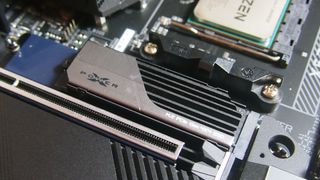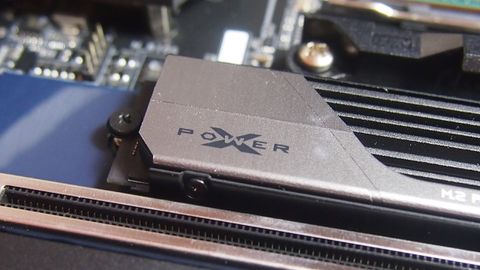Our Verdict
The Silicon Power XS70 is an excellent all-round drive, though the competition never stands still.
For
- Attractive heatsink
- PS5 compatible
- Excellent performance
- Price competitive
Against
- Lacks software
PC Gamer's got your back
Silicon Power is a brand that probably doesn’t get a lot of attention compared to the likes of Samsung or WD, but when you look at its latest XS70 NVMe SSD with its high-end specifications, it's clear that the brand name isn't everything. Armed with the latest Phison controller and high-performance NAND flash memory, a drive like the Silicon Power XS70 should have no problem competing with the best SSDs on the market.
At $240 (AU$499) the XS70 is very well priced for a high performance 2TB SSD, but there's fierce competition in this price range from other third-party SSD makers. Does the Silicon Power drive have what it takes to take market share away from the big players in the space?
The Silicon Power XS70 2TB SSD is a 2280 (80mm length) M.2 PCIe NVMe drive. It combines Micron 176-Layer TLC NAND with a Phison PS5018-E18 controller and 2GB of DDR4 RAM. That's a combination common to many of the best SSDs around, including the highly regarded Seagate FireCuda 530 and Kingston KC3000.
Micron claims that its 176L TLC NAND is the best in the industry with a 30% smaller die size and a 35% improvement in read and write latency over its previous generation 96L NAND. It's easy to understand why most OEM SSD makers are choosing it for use in their high-end designs.
The 2TB XS70 features rated sequential read and write speeds of 7300 MB/s and 6800 MB/s respectively. Once overhead is taken into consideration, it's nearing the limit of the PCIe 4.0 x4 interface. Meaningfully higher sequential speeds will have to wait until PCIe 5.0 drives launch in the future. Random read and write IOPS are rated at 1M/1M. Which is excellent!
The 2TB model I'm testing comes with a 1400 TBW endurance rating to go with a five-year warranty. This matches most of the recent Phison equipped drives, though the Seagate 530 ups this to a very impressive 2550 TBW. You'd really have to hammer your drive with writes to reach those kinds of numbers, though.
The XS70 is designed with PS5 compatibility in mind so the heatsink isn’t as bulky as some others you might come across. It really does look good. Admittedly I'm talking about an SSD here, and its not the kind of thing you'll spend time looking at, but Silicon Power's designers deserve credit.

The XS70 comes in a small package more reminiscent of a flash drive. It doesn't have any software support, which could be a hindrance to inexperienced users hoping to clone their existing drive. This won't matter if you're planning to use it with a PS5, but PC users hoping for a software support ecosystem will be left wanting. Of course, there are a ton of programs that offer diagnostic support and S.M.A.R.T. monitoring.
The XS70 lacks hardware encryption, so if that's important to you, you’ll need to look elsewhere. Again, for a PS5, you'd just install the drive, close the case and probably never give the drive any thought other than keeping an eye on how full it is.
Real-world performance



Synthetic storage performance







Performance isn’t necessarily a clear differentiator at this point in time, making value for money more important than ever
As a Phison E18 drive with 176L NAND, I’d expect it to perform very closely to similar drives such as the Seagate 530 and that’s exactly what it does. Sequential speeds are all but tied. The XS70 holds a very small (if insignificant) lead in random read performance. It's possible that the differences between the two come down to firmware as the Silicon Power drive was released several months after the Seagate.
The XS70 performed well in the thermal test. A load temperature of 63°C for a top spec PCIe 4.0 SSD is outstanding, and it goes to show that modern high performance SSDs require some kind of cooling, either from a bundled heatsink, or from a motherboard. Naked PCIe 4.0 drives are simply too hot.
Overall, the XS70 matches the fastest SSDs on the market. Since the launch of drives such as the Seagate, Kingston, and the MSI Spatium M480, the space is becoming increasingly competitive, populated by SSDs that all perform mostly within a margin of error of one another.
Performance isn’t necessarily a clear differentiator at this point in time, making value for money more important than ever.



The high performance SSD space is closing up. Drives with the latest NAND and Phison E18 controller are ubiquitous. Performance differences have all but vanished and that means aesthetics, thermal characteristics and most importantly, value for money are the primary differentiating factors.
The Silicon Power XS70 2TB isn't revolutionary, but then nobody expects it to be. It's a highly competitive SSD with great performance, an attractive design and it offers good value for money. It's not perfect, it lacks its own software and hardware encryption but for a PS5 or PC gamer, that won't matter. Load it up with your game library and you'll love it.
The excellent all-round performance on offer from the XS70 makes it a very compelling option and it's easily worth considering if it’s price competitive at the time you look to make your purchase.
The Silicon Power XS70 is an excellent all-round drive, though the competition never stands still.

Chris' gaming experiences go back to the mid-nineties when he conned his parents into buying an 'educational PC' that was conveniently overpowered to play Doom and Tie Fighter. He developed a love of extreme overclocking that destroyed his savings despite the cheaper hardware on offer via his job at a PC store. To afford more LN2 he began moonlighting as a reviewer for VR-Zone before jumping the fence to work for MSI Australia. Since then, he's gone back to journalism, enthusiastically reviewing the latest and greatest components for PC & Tech Authority, PC Powerplay and currently Australian Personal Computer magazine and PC Gamer. Chris still puts far too many hours into Borderlands 3, always striving to become a more efficient killer.

I almost quit Fallout 76 until I realized Bethesda still hides its most important setting in a config file

Gloomhaven studio releases a demo for a new game and lays off more than half its employees on the same day

Coming up with 'skeleton outfits' was one challenge of being the Fallout show's costume designer: 'We dressed skeletons right and left'
